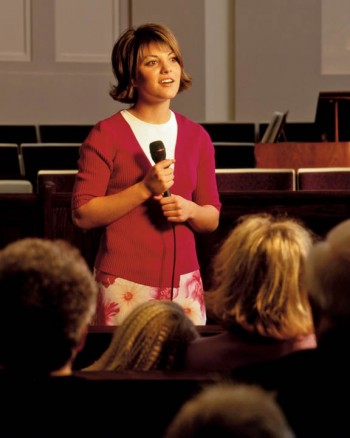 No one gets through life without a fair number of trials. Although we’d all love a trial-free life, in truth, it is through the trials that we experience our greatest growth and learn who we really are. They make the good times better, because we know good times are not promised at all times. Thomas S. Monson, president of The Church of Jesus Christ of Latter-day Saints (informally known as Mormons) talks about trials and what they can offer us.
No one gets through life without a fair number of trials. Although we’d all love a trial-free life, in truth, it is through the trials that we experience our greatest growth and learn who we really are. They make the good times better, because we know good times are not promised at all times. Thomas S. Monson, president of The Church of Jesus Christ of Latter-day Saints (informally known as Mormons) talks about trials and what they can offer us.
On successfully completing the journey of life:
Third, we must not detour from our determined course. In our journey we will encounter forks and turnings in the road. There will be the inevitable trials of our faith and the temptations of our times. We simply cannot afford the luxury of a detour, for certain detours lead to destruction and spiritual death. Let us avoid the moral quicksands that threaten on every side, the whirlpools of sin, and the crosscurrents of uninspired philosophies. That clever pied piper called Lucifer still plays his lilting melody and attracts the unsuspecting away from the safety of their chosen pathway, away from the counsel of loving parents, away from the security of God’s teachings. His tune is ever so old, his words ever so sweet. His price is everlasting. He seeks not the refuse of humanity, but the very elect of God. King David listened, then followed, then fell. But then so did Cain in an earlier era, and Judas Iscariot in a later one.
Thomas S. Monson, “Which Road Will You Travel?,” Ensign, Mar 1991, 2
Calls from God often include trials:
The call to serve has ever characterized the work of the Lord. It rarely comes at a convenient time. It prompts humility; it invites prayer; it inspires commitment. The call came—to Kirtland. Revelations followed. The call came—to Missouri. Persecution prevailed. The call came—to Nauvoo. Prophets died. The call came—to the basin of the Great Salt Lake. Hardship beckoned.
That long journey, made under such difficult circumstances, was a trial of faith. But faith forged in the furnace of trials and tears is marked by trust and testimony. Only God can count the sacrifice; only He can measure the sorrow; only He can know the hearts of those who serve Him—then and now.
Thomas S. Monson, “Your Eternal Voyage,” Ensign, May 2000, 46
We can always turn to God when we have trials or make mistakes:
There are some who have difficulty forgiving themselves and who dwell on all of their perceived shortcomings. I quite like the account of a religious leader who went to the side of a woman who lay dying, attempting to comfort her—but to no avail. “I am lost,” she said. “I’ve ruined my life and every life around me. There is no hope for me.”
The man noticed a framed picture of a lovely girl on the dresser. “Who is this?” he asked.
The woman brightened. “She is my daughter, the one beautiful thing in my life.”
“And would you help her if she were in trouble or had made a mistake? Would you forgive her? Would you still love her?”
“Of course I would!” cried the woman. “I would do anything for her. Why do you ask such a question?”
“Because I want you to know,” said the man, “that figuratively speaking, Heavenly Father has a picture of you on His dresser. He loves you and will help you. Call upon Him.”
A hidden wedge to her happiness had been removed.
In a day of danger or a time of trial, such knowledge, such hope, such understanding will bring comfort to the troubled mind and grieving heart. The entire message of the New Testament breathes a spirit of awakening to the human soul. Shadows of despair are dispelled by rays of hope, sorrow yields to joy, and the feeling of being lost in the crowd of life vanishes with the certain knowledge that our Heavenly Father is mindful of each of us.
The Savior provided assurance of this truth when He taught that even a sparrow shall not fall to the ground unnoticed by our Father. He then concluded the beautiful thought by saying, “Fear ye not therefore, ye are of more value than many sparrows.”3
Thomas S. Monson, “The Peril of Hidden Wedges,” Ensign, Jul 2007, 4–9
Twitter •
